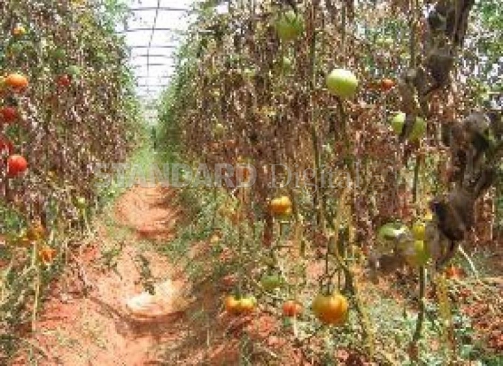
Farmers Advised on Precautionary Measures for Horticultural Crops Amid Untimely Rains
Siddipet, March 25, 2025: With unseasonal rains lashing parts of Telangana, farmers cultivating mango, tomato, and turmeric have been advised to take necessary precautions to prevent crop damage and yield losses. Sri Konda Laxman Telangana Horticultural University, Mulugu, Siddipet District, has issued a set of scientific recommendations to help farmers mitigate risks associated with excess moisture, pest infestations, and diseases.

Dr. Danda Raji Reddy, Vice Chancellor of the university, emphasized that excess rainfall can severely impact horticultural crops, leading to root damage, fruit cracking, fungal and bacterial infections, and pest proliferation. He urged farmers to take proactive measures to ensure crop health and maintain high-quality yields, particularly in export-oriented crops like mango.
Precautionary Measures for Mango Farmers
Mango orchards are particularly susceptible to waterlogging, disease outbreaks, and pest infestations due to untimely rains. The following steps can help farmers protect their crops:

- Water Management:
- Stagnant water should be drained within 24 hours to prevent root rot and fungal infections.
- Proper drainage systems must be maintained by constructing high embankments around the orchard.
- Pruning & Disease Prevention:
- Wind-damaged branches should be pruned and treated with a paste of copper oxychloride (20g per liter of water) to prevent secondary infections.
- Fallen fruits, which serve as breeding grounds for pests, should be collected and destroyed.
- Fungal and Bacterial Disease Control:
- There is a high risk of Bird’s Eye disease (anthracnose) during wet weather. To prevent this, farmers should spray copper oxychloride (3g per liter of water).
- Bacterial infections are also likely, and can be managed by spraying streptomycin sulfate (0.5g per liter of water).
- Enhancing Fruit Growth & Quality:
- Potassium nitrate (10g per liter of water) should be sprayed to promote fruit size and uniform growth.
- To prevent fruit cracking, boron (1.25g per liter of water) is recommended.
- Copper oxychloride, streptomycin sulfate, potassium nitrate, and boron can be combined and sprayed together for effective disease and growth management.
- Fruit Fly Control:
- The current wet conditions create an ideal environment for fruit fly eggs to hatch, potentially leading to severe infestations.
- Farmers should install 10-20 methyl eugenol (bait) traps per acre to control the pest population.
- Export Quality Assurance:
- Farmers aiming for export-grade mangoes should bag individual fruits to enhance their appearance, reduce blemishes, and prevent pest damage.

Precautionary Measures for Tomato Farmers
Tomato crops are highly sensitive to excess moisture, which can lead to fruit cracking, flower drop, and nutrient deficiencies. Farmers are advised to take the following precautions:
- Preventing Fruit Cracking:
- Spray borax (2-3g per liter of water) to strengthen fruit walls and reduce the chances of splitting.
- Maintaining Fruit Set:
- If the crop is at the fruit-setting stage, Planofix (1 ml in 4.5 liters of water) should be sprayed to prevent flower and fruit drop caused by sudden weather fluctuations.
- Boosting Plant Nutrition:
- A micronutrient mixture (5g per liter of water) should be sprayed to ensure proper plant growth and resilience against stress.
Precautionary Measures for Turmeric Farmers
Turmeric farmers currently engaged in the drying process must take extra care to protect harvested produce from excess moisture:
- Rain Protection:
- Dried turmeric must be covered with plastic sheets to prevent reabsorption of moisture, which can lead to quality deterioration and fungal contamination.
Expert Recommendations and Farmer Support
Dr. Danda Raji Reddy stressed that adopting these measures promptly will help farmers minimize economic losses and maintain high-quality produce despite the challenges posed by unseasonal rains.
He also assured farmers that Sri Konda Laxman Telangana Horticultural University is closely monitoring the situation and remains committed to offering timely guidance and scientific solutions to protect Telangana’s horticultural sector.
Farmers are encouraged to stay in touch with local agricultural officers and university experts for further assistance in managing their crops effectively during this unpredictable weather period.


